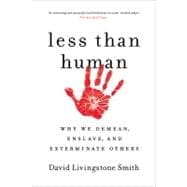
Dr. David Livingstone Smith is a professor of philosophy and founding director of The Human Nature Project at the University of New England. He is the author of Why We Lie and The Most Dangerous Animal and lives in Portland, Maine. Visit his blog at realhumannature.com.
“Smith reasonably argues that dehumanization is rooted in human nature…. He offers a rigorous philosophical theory... informed by his discipline’s precision, and by certain well-founded suppositions about the mind...an interesting and unusually lucid book about an under-studied subject.” - New York Times Sunday Book Review
“Smith offers an impressively thorough survey of ‘dehumanization’ as it has been deployed against Jews, African-Americans, and other ‘Others’ — as an accompaniment to exploitation or extermination.”—Barbara Ehrenreich, Los Angeles Review of Books
“David Livingstone Smith produces a clear and illuminating vision of why human beings are the way we are and how we got this way. The scholarship is broad, the insight is deep and the prose is compelling. Less Than Human will change the way you think about things that matter profoundly. This is dazzling stuff.”-- Steven E. Landsburg, Ph.D., author of The Big Questions
“Warning: This book will challenge you! Not that it’s hard to understand -- in fact, it's wonderfully accessible -- but it raises some terrible realities. For this reason, it is all the more important that you read Less that Human. It is brilliantly written, carefully researched, and a wonderful and much-needed opportunity for us to explore what it might mean to be ‘truly human’.” -- David P. Barash, author of Payback: Why We Retaliate, Seek Revenge and Redirect Our Aggression
"This is a beautiful book on an ugly topic. David Livingstone Smith uses the newest research in cognitive science to address the problems of racism, genocide, and atrocity, presenting a provocative theory as to why we come to see others as less than human. There are deep and important ideas here, and this engaging book should be read by anyone interested in the worst aspects of human nature -- and how we can come to transcend them." -- Paul Bloom, author of How Pleasure Works: The New Science of Why We Like What We Like and professor of psychology, Yale University
“One part detective story, one part horror story, one part evolutionary philosophy, Less Than Human is actually a book about what it means to be human. As such, there are few of us who can afford to miss it.”--Peter Swirski,Ph.D., author of American Utopia and Social Engineering in Literature, Social Thought, and Political History, Professor of American literature and culture at the Department of English, University of Missouri, and Research Fellow at the Helsinki Collegium for Advanced Studies
"Dehumanization is a thoroughly human behavior. It is a tool we have used for millennia to bolster our self-esteem, to justify slavery and exploitation, to get ourselves to kill and exterminate. Yet, despite its terrible significance, surprisingly little scholarly attention has been trained on the phenomenon -- on its origins, how it works, and how we might avoid its dreadful toll. Bringing enviably acute skills as a philosopher to bear on the subject, David Livingstone Smith draws on an impressive range of sources to argue that dehumanization emerges from the very core of our humanity, our ability to reflect upon our own thoughts. Writing in an engaging and accessible style, he uses an incisive logic to pare away the layers of his subject to reveal this troubling conclusion. This is an important book for anthropologists, who are interested in ethnocentrism, and for any human concerned about our capacity to harm one another."--Paul Roscoe, Ph.D., Professor of Anthropology, University of Maine.
The New copy of this book will include any supplemental materials advertised. Please check the title of the book to determine if it should include any access cards, study guides, lab manuals, CDs, etc.
The Used, Rental and eBook copies of this book are not guaranteed to include any supplemental materials. Typically, only the book itself is included. This is true even if the title states it includes any access cards, study guides, lab manuals, CDs, etc.